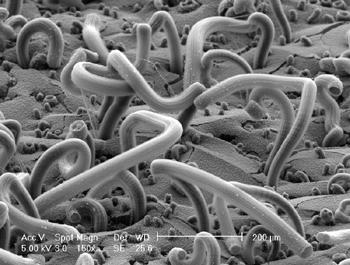
For my final blog, I have chosen to discuss two examples of order and three examples of chaos that most accurately describe how my definitions of order and chaos have evolved and expanded from the Order & Chaos class. Although my definition of order and chaos relying heavily on each other to actually exist as themselves has not changed, it has been reinforced by the examples we selected on the first day of class and by the reading assignments throughout the term. I have chosen to elaborate on tidiness when cleaning a room, yelling from a military leader, the clutter of NYC, the insanity of college life, and the blatant disobedience from Massachusetts drivers.
First of all, one of my least favorite activities is cleaning my room. When my room is "a pig sty" as my mom likes to call it, I know exactly where everything is. After cleaning my room, I have no idea where anything is, but nothing is where I would ordinarily put it, thus creating absolute chaos out of the order that I have been forced to comply with. For example, Job tried so hard to be good and ordered, that everything just went the wrong way and he eventually gave up and when he stpped trying to be good, things eventually worked out for him.
The second example I chose, orders being screamed from an authoritarians mouth, is an example of forcing order upon people by use of chaotic methods. I think we can all agree that yelling and screaming is not generally filed under the "order" category when we hear it, but in this case, the chaos has created order by pressuring others into being obedient. An example wpuld be from George Orwell's 1984, when Winston has chaotic thoughts firing through his brain, Big Brother is always there to put his thoughts in order via scare tactics.
Next, I chose to discuss the clutter of NYC. I think it is interesting that NYC was so carefully organized into little blocks and boroughs, yet it is always one of the most chaotic places in the country. Also, the city is divided into boroughs like Queens, the Bronx, and Manhattan, which may be physically ordered, yet the boroughs behave like sports teams and form rivalries against each other which absolutely creates chaos. This is similar to Blade Runner's replicas vs. humans dilemma. The main group created two separate "pawns" who eventually realized that they had differing qualities, and each wanted the other either gone or to be given what the other had.
My favorite example is the insanity of college life. Although college life seems very structured and scheduled and well-advised, it takes an incredible amount of chaos-loaded effort to get it anywhere near that ordered, and even when the order is in place, it's pure chaos trying to keep up with that order. An example of trying to keep up with order would be 1984, when all of the people were trying so hard to abide by the rules lest they "mysteriously disappear," that they ended up practically being crazy. In fact, Winston was only able to keep track of anything by writing it down in a journal (secretly, of course."
As a Mainer, or "Maniac" according to many Massachusetts residences, I personally hate the majority of all Massachusetts drivers. For some reason, they have almost all decided that the rules of the road do not apply to them, and it's extremely frustrating to have to deal with them on the road without killing them. When I think of them now, they remind me of the replicas from Blade Runner, who were always in the way and breaking all of the rules trying to get what they want. Although Massachusetts drivers have no reason to be as desperately disobedient as the replicas, for some reason, they have decided to be little rebels and go nuts to get where they want to be.
Overall, my definition of order and chaos has not changed, but at the same time, what I believed in before is still reinforced by what we learned throughout the term, and I have seen that throughout history, the theory of order and chaos being intermixable has not changed.







